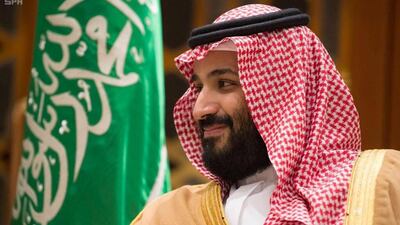Last week's dramatically-launched anti-corruption drive in Saudi Arabia has left people in shock. But such big surprises are becoming regular fare as Crown Prince Muhammed Bin Salman and the country's government steadfastly pushes forward with the Vision 2030. What should we expect next?
Technically, we shouldn't have been surprised by the government's crackdown, since it has actually taken the time to telegraph its intentions in plain English (and Arabic) in its Vision 2030 document, published in April 2016. Anti-corruption measures fall under the theme of "An Ambitious Nation Effectively Governed," wherein we find the goal of "embracing transparency." The opening sentence reads: "We shall have zero tolerance for all levels of corruption, whether administrative or financial."
However, the opening broadside on November 4 still leaves a lot of work before those overseeing the Vision can check this goal off their to-do list. Among the remaining steps are the adoption of "leading international standards and administrative practices," and upholding "high standards of accountability." The ultimate goal is "the highest levels of transparency and governance in all sectors."
These steps should be music to the ears of prospective investors at home and abroad. The world’s leading index of economic freedom, produced by the Heritage Foundation, contains a section on the rule of law, which is the most important indicator from the perspective of foreign capitalists. In 2017, Saudi Arabia scored 47% on the “government integrity” sub-indicator, compared to a world average of 40%. The accompanying report remarked: “Despite some earlier moves to hold certain officials accountable, corruption remains a significant problem, and there is low transparency in the functioning of government as well as opacity about state budgets and financial practices.”
Those looking for an explanation for the crackdown should take the time to consider the economic factors, rather than fixating on the political angle. Saudi Arabia needs foreign capital, and its capacity to attract it has been damaged by tightening capital markets and hawkish central bankers in both the USA and Europe.
Saudi Arabia's government has wisely surmised that systematic reforms are required to its economy in order to attract outside investors, and has not shied away from fundamental reforms and sweeping measures such as the new anti-corruption drive. At the same time, such an initiative sends a clear message to Saudi citizens working in or with the public sector that malfeasance will no longer be tolerable.
________________
Read more:
What lies behind the Arabian Gulf states’ appetite for mega projects?
Why is it so hard to get a clear picture of Aramco IPO?
How do young leaders differ from the old guard?
________________
So what comes next? A scientific paper authored by Danish-based economists Thomas Barnebeck Andersen, Jeanet Bentzen, Carl-Johan Dalgraad, and Pablo Selaya, published in the 2011 World Bank Economic Review, argues that transforming government services to electronic form is an effective anti-corruption measure, for three reasons.
First, e-services reduce the distance between government and citizens, and in some cases eliminate the need for human intermediaries such as civil servants. This helps diminish the possibility of corrupt interventions by those intermediaries. For example, when a driver's license is granted by a human agent, this affords that agent the opportunity to receive bribes in exchange for the basic service itself, or even for illicit variants, such as granting a licence to an underage driver. By contrast, when a licence is issued by a computer, ensuring adherence to rules and regulations is more straightforward.
Second, electronic services require standardised rules and procedures, which further reduces the possibility of a civil servant deploying his or her discretion against the public’s interest. In the case of the driver’s licence, linking it to the population database makes it easier to strictly enforce the minimum-age requirement for applicants.
Third, electronic services can be monitored in a more transparent fashion than paper or face-to-face transactions, helping dissuade civil servants and politicians from corrupt practices. Correctly-structured security protocols make it much harder for the electronic analogue of “losing a receipt” or “misplacing an application form” to occur.
In a World Bank blog on how to combat corruption, Augusto Lopez-Carlos discussed Andersen et al’s paper, and explained how Chile had produced an exemplary public procurement system by exploiting the advantages of electronic services. Launched in 2003, the system has been a model of transparency, and by 2012, Chileans had used it to perform 2.1 million purchases valued at over $9 billion. In a region typified by high levels of government corruption, Chile’s strategy has helped deliver enviable levels of prosperity to its citizens, and is a key reason why its Heritage government integrity score is 71%, 22nd in the world.
As Saudi Arabia moves on to the next step in its own anti-corruption campaign, it would surely benefit from studying the Chilean experience. While many government services have already been transformed into electronic form, such as passport renewal, casual conversations with Saudi citizens suggest that the current public procurement system offers plenty of malfeasance opportunities to unscrupulous actors.
Governments have been reforming themselves for centuries, and economic crises are often the catalyst. There is no question that Saudi Arabia is facing a grave economic threat at present; and like its Chinese counterpart, the Saudi government has correctly surmised that tackling corruption is a critical reform. Xi Jinping’s crackdown has earned China a 6-point increase in its Heritage government integrity score; investors will be keenly watching to see what the 2018 report says about Saudi Arabia.
Omar Al-Ubaydli is a researcher at Derasat, Bahrain. We welcome economics questions from our readers via email (omar@omar.ec) or tweet (@omareconomics).


